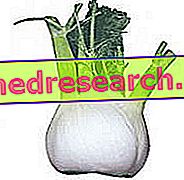Watch the video
X Watch the video on youtubeThe various fennel teas are attributed with stimulating actions on the motility of the stomach and intestines, and also the increase due to the reflex phenomenon of salivary secretion.

Properties of fennel:
- Carminative
- Antispasmodic
- Antibacterial and
antifungal;
- Relaxing action on
smooth muscle
Fennel therefore finds space above all in those herbal teas aimed at the symptomatic treatment of digestive disorders, such as slow digestion and gastric dyspepsia, especially when accompanied by swelling, belching and flatulence; it can also be used to alleviate abdominal pains of digestive origin (gaseous colics, such as those of the newborn). Potentially useful is also the fluidifying effect of fennel on catarrhal secretions, in addition to the well-known flavoring effect. The carminative properties of the plant, already known to the ancient Egyptians, favor the physiological elimination of intestinal gases and help digestion, helping to mitigate the annoying sense of abdominal bloating.
For the preparation of the herbal tea we use the fruits of fennel, improperly called seeds, which contain volatile oils responsible for the aforementioned eupeptic and carminative properties.
The occasional use of fennel tea is not prohibited in any age group; however, prolonged use at high doses is not recommended, while preventive medical consultation is recommended in the presence of diseases and particular physiological conditions (pregnancy, lactation, newborns).
The intake of fennel teas is traditionally suggested to the nurse after each feeding or administered directly to the baby with a bottle between meals; all this in order to stimulate the mother's milk secretion and reduce the appearance of newborn colic, which often accompanies it in the first 3-4 months of life. As far as this last point is concerned, the therapies currently reported in the literature involve the use of antispasmodics and natural drugs such as Fennel, Chamomile and Lemon Balm. A controlled clinical study examined 125 newborns, between two and twelve weeks, who were given fennel seed oil or a placebo, for 15 days. The evaluation parameters were based on frequency and duration of crying. At the end of the observation period, as many as 65 percent of the verum group infants no longer suffered from intestinal gaseous colic, compared with 23.7 for placebo infants. Furthermore, the study did not detect any noteworthy side effects, despite the very early age of the subjects examined.
For therapeutic purposes, however, standardized preparations are preferred to traditional fennel teas; in infusions, in fact, the amount of active ingredients extracted varies considerably according to the characteristics of the drug and the method of extraction (water temperature, infusion time or decoction etc.). It is advisable to prefer products with reduced estragole content, a molecule with a carcinogenic action that leads some doctors to advise against the use of fennel infusions in the most vulnerable sections of the population (newborns, children and pregnant or lactating women).
Now let's see a series of fennel-based teas:
Examples of fennel teas
Carminative fennel tea, against colitis, dyspepsias, bloating, meteorism, flatulence | |
| Anise (fruits) | 50 g |
| Fennel (fruits) | 20 g |
| Coriander (fruits) | 20 g |
| Licorice (root) | 10 g |
| Cloves | 4-5 n |
| 15-20 grams in half a liter of water. Leave to macerate for 15-20 minutes. Boil for 1-2 minutes. Leave to rest for a long time, filter and drink in 2-3 doses (after the main meals). | |
| Digestive herbal tea, aperitif, purifying, carminative, against abdominal cramps | |
| Rosemary leaves cut herbal tea | 20% |
| Whole linden flower | 20% |
| Fennel bruised fruit | 20% |
| Herbal tea herb centaurea | 20% |
| Peppermint leaves cut herbal tea | 20% |
| 2 tablespoons of mixture per liter of boiling water, to be poured onto the preparation leaving it to infuse for 15 minutes. Filter before use; drink 2-3 cups of fennel tea a day. | |
Simple fennel tea against newborn colic | |
| Fennel (fruits) | 5 g |
A teaspoon per 100-150 ml of water, to be poured over the non-boiling drug to avoid the dispersion of the volatile active ingredients. | |
Fennel tea against newborn colic | |
| Fennel (fruits) | 5 g |
| Chamomile (flowers) | 5 g |
| Melissa (leaves) | 5 g |
| A teaspoon of preparation for 100-150 ml of water, to be poured over the non-boiling drug to avoid the dispersion of the volatile active ingredients of the fennel tea. | |



